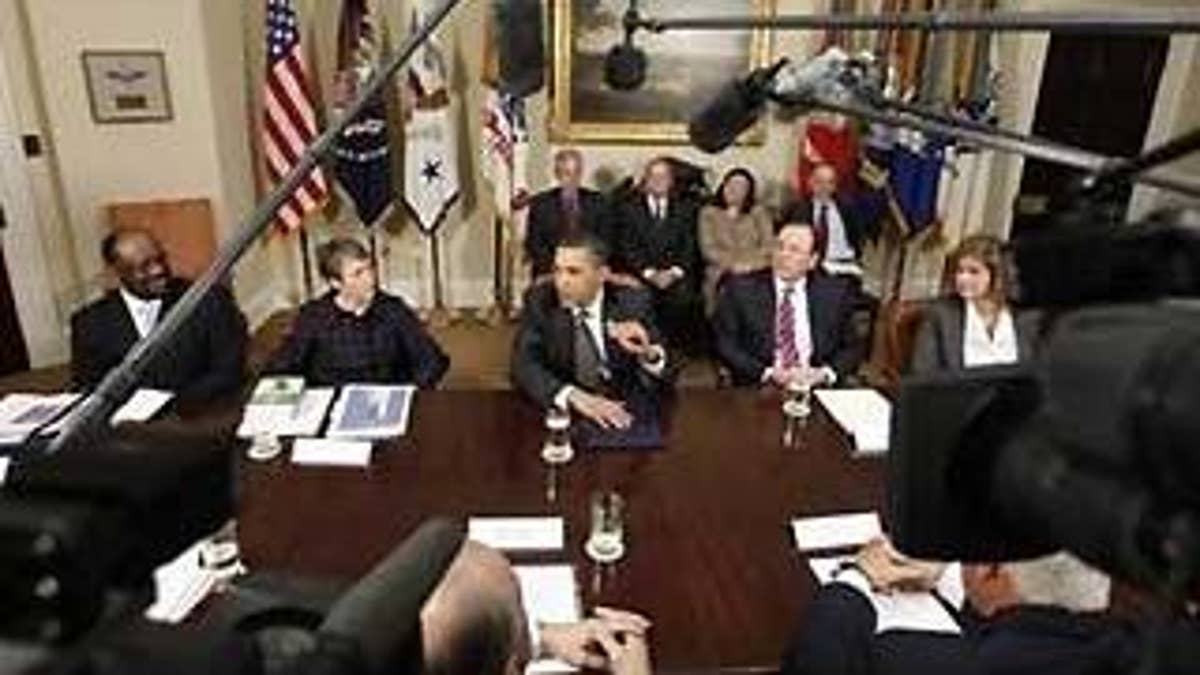
WASHINGTON -- President Obama and House Democrats pledged Wednesday morning to pass a health care reform bill by July 31 -- a vow the White House believes will advance its goal of seeing health care legislation signed into law by year's end.
"We've got to get it done," Obama said in an appearance at the White House with House Speaker Nancy Pelosi and other key congressional lawmakers standing on the south driveway. "We've got to get it done this year both in the House and the Senate. We don't have any excuses. The stars are aligned."
Obama made the announcement after huddling with Pelosi, House Majority Leader Steny Hoyer, and Reps. Charlie Rangel, Henry Waxman and George Miller. They stood with the president to symbolize their commitment to moving a bill before Congress leaves Washington for the August recess.
"Our goal is to have a healthier America," Pelosi said, expressing confidence that legislation will be on the floor by the end of July. "And that is cause for celebration for the American people."
The announcement did not describe the contents of the health care bill -- leaving key questions about funding, coverage and access for another day. The Obama strategy is to stay above the legislative fray, keeping the process moving forward and the industry players in the mix until the tough legislative choices are made this summer and fall. But this public commitment on timing, the White House believes, will help solidify the legislative process that will produce a bill and bring the nation closer than ever before to the Democrats' long-sought goal of universal health coverage.
House Republicans assailed the Democrats' health care plan at a weekly GOP leadership news conference.
Republican Conference Chairman Mike Pence, R-Ind., said that despite the cooperation of private insurers, hospitals and doctors, the health care plan will still hurt the private insurance system and put Americans on the government dole.
"That is simply a pathway to socialized medicine and the American people aren't buying it," he said.
House Minority Leader John Boehner, R-Ohio, said offering a government option to buy health care will starve out the private option.
"I think we have to be very careful here that we don't throw the baby out with the bath water," he said. "Let's go in and figure out how we can better control costs. Let's go in and figure out how we can better provide access to affordable high quality insurance."
House action by July 31 will set the stage for Senate action in September and October. Top White House advisers then envision completion of a conference committee merging the House and Senate bills before Congress adjourns for the year -- allowing Obama to sign the historic legislation, which many Republicans critics say could set the stage for "socialized" or "nationalized" health care, some time in November or December.
Senior White House officials regard this week as something of a breakthrough on health care, starting with Monday's non-specific and unenforceable commitment from doctors, hospitals, insurers and drug companies to reduce health care costs by $2 trillion over 10 years. Though this vague pledge has since drawn skepticism, top Obama advisers say it changes the political dynamic by depriving Republican critics of the grassroots and fundraising clout that would be theirs if doctors, hospital, insurers and drug makers refused to cooperate with the White House -- as they appear to be now.
"It's hard to talk about socialized medicine when the hospitals, doctors, insurers, the private sector players are working with us at the White House," a top White House official said.
With Tuesday's event highlighting private sector efforts to promote wellness, the White House continued its bid to reinforce the role industry can play in health care reform. The frame for the week is designed to calm fears about a government takeover of health care and Wednesday's schedule announcement will cap Obama's three-day focus on health care.
These developments will also be fodder for Obama's road trip to Arizona and New Mexico later in the week. The White House delights in taking Washington-based actions on the road and is particularly eager to tout what they regard as Obama's unique ability to change the tone and politics of health care reform.
In truth, the main health care players see Obama and his Democratic allies have the votes necessary to pass health care in the House and Senate and have joined the White House effort to preserve their negotiating clout as the bill moves through the process.
"They made a business decision," a top White House adviser said of the industry moves this week -- reinforced by a letter sent to Obama Tuesday promising to specify cost-saving moves in the near future.
FOX News' Major Garrett contributed to this report.




